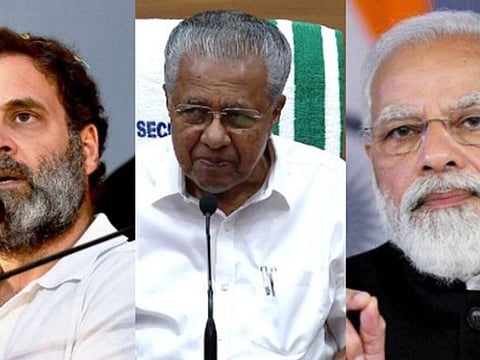

As Kerala gears up for the crucial Lok Sabha polls on April 26, all eyes are on whether the Bharatiya Janata Party (BJP) will secure its first-ever seat in the state's southern territory, comprising 20 parliamentary constituencies.
In recent elections, Kerala's political landscape has witnessed a departure from traditional bipolar politics dominated by the Congress-led United Democratic Front (UDF) and the CPM-led Left Democratic Front (LDF). The BJP has emerged as a significant player, vying strongly in five key constituencies such as Thiruvananthapuram and Thrissur.
The Congress and CPM, both part of the I.N.D.I.A bloc, are engaged in a fierce battle for supremacy. The Congress seeks to maximize its seat share in Kerala to bolster its national prospects for returning to power, while the CPM aims to retain a substantial number of seats in its lone stronghold to maintain its national party status.
The BJP is leveraging Prime Minister Narendra Modi's pro-development and welfare initiatives, epitomized by the 'Modiyude guarantee' slogan, along with tapping into anti-incumbency sentiments against the LDF government. Modi's frequent campaign visits to Kerala underscore the BJP's intensified focus on the state.
Despite efforts to sway traditional Congress and CPM voters towards the BJP, initiatives such as the Citizenship Amendment Act (CAA), Uniform Civil Code, and attempts to link historical Hindu connections to mosques have faced resistance from Kerala's secular society across religious lines.
The saffron camp's attempts to gain ground among the Christian demographic, constituting over 18% of the state's population, have encountered resistance from church leaders concerned about communal harmony and measures impacting foreign donations to church-run charities.
The Muslim community, comprising around 27% of Kerala's population, remains skeptical of the BJP due to perceived unfavorable central policies. Modi's contentious remarks in Rajasthan further strained relations with Kerala's Muslim electorate, drawing strong rebukes from Congress and CPM leaders, including Chief Minister Pinarayi Vijayan.
The prospect of minority and anti-BJP vote consolidation remains strong in Kerala, with speculation of tacit Congress-CPM cooperation to thwart BJP's electoral ambitions.
Both Congress and CPM are highlighting issues like the CAA and Manipur violence to court minority votes, with the Congress expected to benefit more due to its national stature. The Congress is capitalizing on allegations of BJP and Sangh Parivar undermining secularism and anti-incumbency against the Pinarayi Vijayan government.
Despite its sweeping victory in 2019 with 19 seats, the Congress faces challenges this election, notably the absence of widespread support for a government led by Rahul Gandhi.
In an intriguing dynamic, Pinarayi Vijayan and Rahul Gandhi, allies at the national level, engage in personal attacks against each other. Vijayan's strategy aims to secure a substantial CPM seat share in Kerala to counter anti-incumbency sentiments and deflect scrutiny over his daughter's dealings with a mining firm.
As Kerala braces for a contentious electoral battle, the BJP's bid for a parliamentary foothold faces formidable challenges posed by entrenched Congress and CPM dominance, coupled with Kerala's secular ethos and complex social fabric. The outcome of these polls will shape Kerala's political landscape and influence national narratives.
